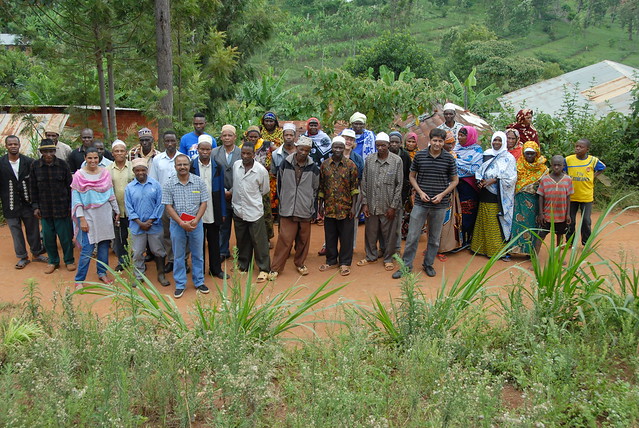
Dairy innovation platform members in Ubiri village, Lushoto, Tanzania (photo credit: ILRI/Niels Teufel).
Recent reviews of capacity building training of dairy innovation platforms in Tanga and Morogoro in Tanzania highlight key opportunities and challenges in improving dairy production in the country.
The reports assess the outcomes of training programs held in December 2014 and January 2015, targeting dairy innovation platform leaders in the two regions to enhance their capacity and understanding of the functioning and usefulness of innovation platforms established by MilkIT, one of the projects under ‘Maziwa Zaidi’, the Tanzania dairy value chain development program.
Executive committee members of eight village innovation platforms established under the project in four districts in Morogoro and Tanga regions were trained.
According to the review, challenges such as access to veterinary services and inputs can be addressed if innovation platforms are elevated beyond the village, to the district to make them attractive to a more diverse group of value chain actors. Most platforms consist mainly of producers because they are based at the village level, widening their scope could potentially help them incorporate more players such as researchers, extension officers, farmer organizations, private enterprises, NGOs and policymakers.
Successes were reported in Kilosa District where the platform in Mbwade has addressed water challenges by digging two wells after linking its work with an iWASH initiative. This platform has succeeded in creating ownership among members who contribute to meet costs of running the platform. Elsewhere, the Twatwatwa platform, also in Kilosa, has successfully worked with stakeholders to build wells and water troughs to provide household and livestock water needs. This platform has also included women in its operations and given them leadership positions and is improving extension services and reducing land conflicts between farmers and livestock keepers by being involved in grazing land demarcation initiatives.
To make the platforms sustainable, the reports say, members need to have access to financial services, which can be achieved by attracting actors in the finance sector and members should be trained as para-veterinary extensions to, in the short-term, address unavailability of veterinary services in most areas. The report also calls for support to the platforms to help them exploit existing markets to increase milk production through, for example, setting up of more milk collection centres. Maziwa Zaidi projects should continue training and monitoring the platforms and ensuring clear exit strategies for long-term sustainability of the dairy platforms.
